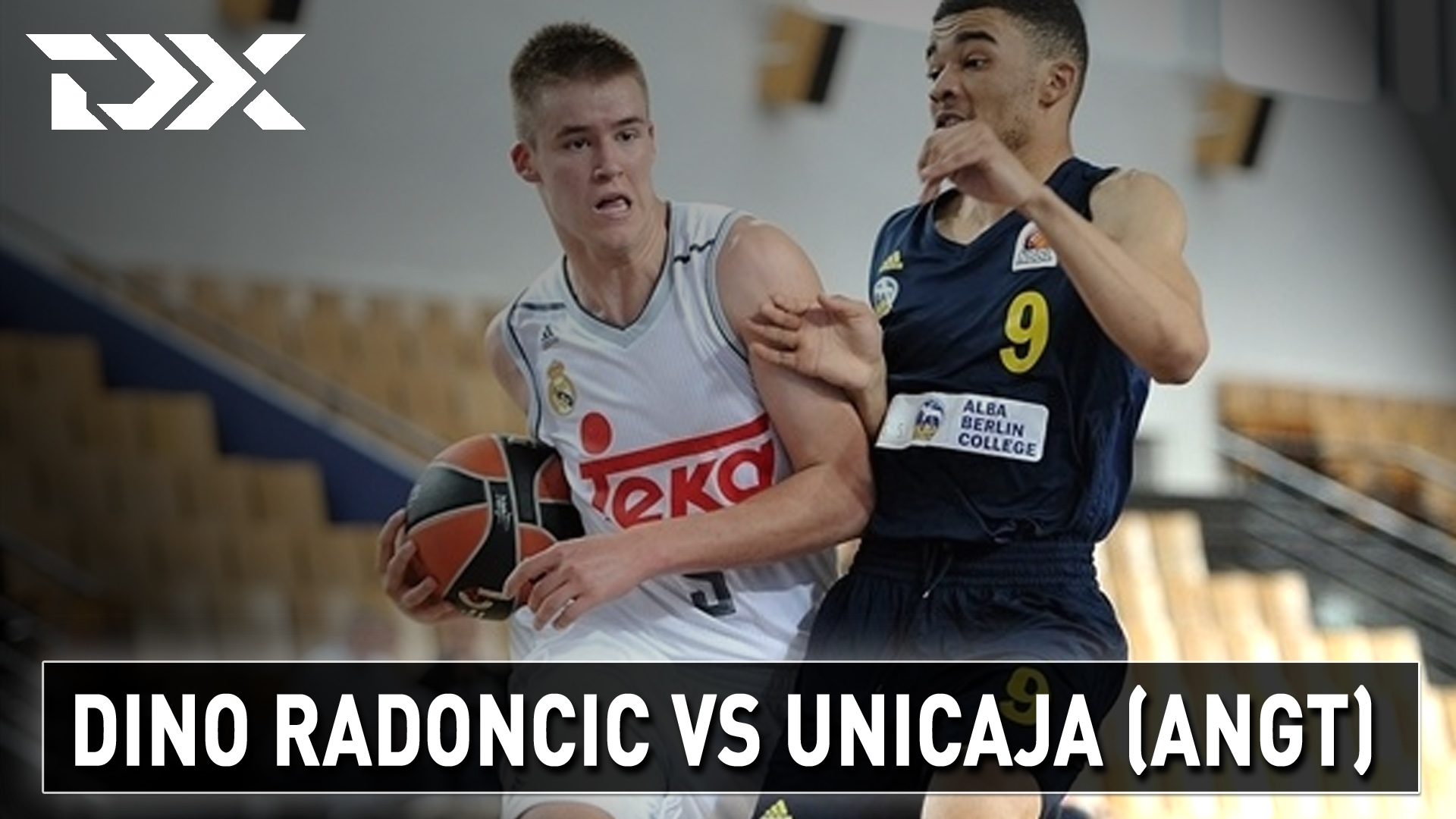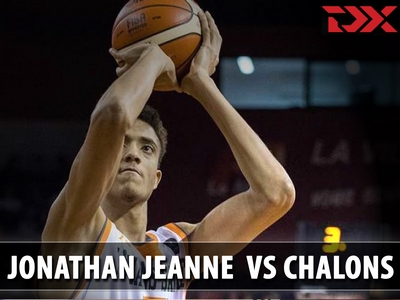First, it's important to make the distinction between areas in which the game itself is existent or not. For many African players vying for a spot in the NBA, playing college basketball is the only realistic option that makes sense. Though the game is expanding in Africa thanks in large part to the networking of people like Masai Ujiri (a Nigerian international scout for the Denver Nuggets) and Amadou Gallo Fall (Senegalese director of scouting for the Dallas Mavericks,) strong developmental leagues for African players are still few and far between. As a result, many Africans have no choice but to play college basketball. Of the nine African born players drafted by NBA teams since 1996, seven have been from college programs. Today the NCAA is stocked with African players, with Maryland's Ekene Ibekwe heading a list of five Nigerians in the ACC alone. For now, most African players see college basketball as their primary ticket to not only the NBA, but to a good education. The same can be said for international players from anywhere basketball is not prevalent, such as Eduardo Najera from Mexico or Adonal Foyle of the Grenadines (both drafted out of college).
For Europeans, the decision to play college basketball is a much tougher one. Up to this point, history indicates that if you're a European player who wants to get drafted by an NBA team, it's best to stay in Europe. In their never ending quest to find the next Dirk Nowitzki, Toni Kukoc and Peja Skojokavic, NBA teams have drafted largely unproven European products, resulting in only twelve of the 89 European players drafted since 1996 coming from college. "It's just human nature, says Coach David Thorpe, Executive Director of the 5-Star Pro-Training Center. "The more youre with someone, the more you get to know them, good and bad. In an evaluation process you run the risk of having your warts exposed."
Thorpe has served as consultant to NBA players such as Udonis Haslem of the Miami Heat and Kevin Martin of the Sacramento Kings, helping them develop their games for the NBA level. Thorpe also worked with Linas Kleiza, a Lithuanian forward drafted by the Denver Nuggets last June out of the University of Missouri. Though Kleiza was drafted late in the first round, many would argue that he would have been a higher pick had he never set foot in a college gym. Kleiza was a standout playing for the Lithuanian National team, where he averaged 29 points and 9 rebounds at the 2003 World Junior Championship (second only to Andrew Bogut).Though he showed short flashes of the same brilliance in his two seasons at Mizzou, Kleiza was plagued with injuries and inconsistency, and had to deal with the distraction of a scandal involving his head coach Quin Snyder and point guard Ricky Clemons. By the time Kleiza declared for the draft, he was hit with the dreaded "Tweener" label, a phrase describing basketball players with no defined position at the NBA level. When Kleiza and his father came to Coach Thorpe last spring, seeking advice on how to prepare for the upcoming draft, Thorpe recommended Kleiza lose thirty pounds and revert to using more of the face-up game that made him an NBA prospect in the first place. Kleiza followed the advice of Thorpe, but was also fortunate that Masai Ujiri (Denver Nuggets Scout) had been tracking him thought his career and knew his capabilities as a player, even if he wasn't necessarily displaying those talents at the college level.
Many players don't get that kind of chance. Ex-Florida Gator Christian Drejer of Denmark knows all too well about choosing the wrong college. Drejer was widely regarded as a high first round pick before ever playing a game in the collegiate ranks. However, a severe ankle injury, coupled with his inability to adjust to the style of play in the SEC, led to Christian's abandoning his team. Midway through his sophomore season, Drejer left to sign a professional contract in Spain. Widely regarded as the most athletic conference in the nation, the SEC was a terrible fit for Drejer's style of play. Had Drejer chosen a less athletic, more team-oriented program to suit his game, things probably would have worked out a lot differently. "These kids have no idea...Florida, Florida State, South Florida; they don't know the difference between any of these schools, let alone the difference between conferences," says Thorpe. So if Drejer didn't know the difference, shouldn't it be up to Florida to know that Drejer probably wasn't the best fit for their team? Thorpe says that's not as easy as it sounds. "Its hard enough to evaluate American kids to figure out if they'll fit into your school culture, than you factor in a kid from Denmark. Slovenia's Erazem Lorbek had similar trouble making the transition from international to college basketball at Michigan State, where he could no longer deal with Tom Izzo (who is notorious for berating freshman) and wanted Lorbek to play as more of a back to the basket center, something Lorbek was not comfortable with. ESPNs Fran Fraschilla thinks Lorbek may have made the wrong choice in picking his school as well: Lorbek is a good example. You look at him play now and he is the prototypical inside-out four man. And if he had to make a decision over again, he might want to play in a situation that would utilize his ability to shoot 3s, allow him to step away from the basket and maybe fill the high post at the end of the break and shoot the top of the key 3-point shot without getting a dirty look after he shot it cause it was a quick shot.
Though there have been instances where foreign players have failed trying to make the adjustment to college basketball, there have also been some success stories. Perhaps none more significant than Andrew Bogut of the Milwaukee Bucks. After leading the University of Utah to the Sweet 16, winning national player of the year, being the first player taken in the 2005 draft and (if that wasn't enough) quickly having his jersey retired at Utah, it's safe to say things couldn't have gone much better for Mr. Bogut. What many people don't realize, however, is that Bogut's storybook career at Utah was close to being over before it ever began. After an icy relationship with Coach Rick Majerus his freshman season, Bogut was close to leaving Utah for a lucrative contract in Europe. It wasn't until new coach Ray Giacoletti (Majerus left the program for health reasons) made a personal trip to visit Bogut in Australia that the seven-footer decided to return.
With Kleiza, Drejer and Lorbek ending up in rough situations and Bogut finally landing in an ideal one, what gives? What does it take for a foreign player to pick the right school? If anyone knows that answer, its ESPNs Fran Fraschilla. In addition to his twenty three year college coaching career, Fraschilla has served as a scout for the New York Knicks and coached and covered (for ESPN) the unofficial NBA Pre-Draft camp in Treviso, Italy. Fraschilla says its all about finding the right fit for your style of play, and that starts with finding the right coach. I think they need to, number one, figure out what their weaknesses are, says Fraschilla From my experience, Ive also seen that a lot of the international kids can handle the tough love approach, the Serbian and Croatian kids for example, theyve been coached hard. I think you need to educate yourself about the kind of coach you are going to play for, what is his personality, and how will you fit in with that personality. But how do these players, many with limited English and knowledge of college basketball go about finding what colleges are the best fits for them? Obviously you can do your research, sometimes even on the internet, says Fraschilla. But kids even in America get fooled by coaches. And a lot of times its just hit and miss. The thing I would do if I was an international kid, dont pick a school unless the head coach comes to visit you makes a special trip to come see you and your family. So before you leave for the United States, youve already established a relationship with that head coach and your family has as well. With the hectic agendas of college coaches, do they really have time to hop on a plane and fly around the world just to establish a relationship with one player? You make time, says Fraschilla. Do you think it was worth it that Ray Giacoletti got on that 20 hour flight to Australia to spend about half a day with the Boguts? Finding the right fit is obviously not an easy thing to do, and it takes a lot of work from both the player and the school. It's very hard, says Coach David Thorpe, You have to get a little lucky and you have to have that right person tap you on the shoulder that really does have your best interest."
For Oregon State forward Sasa Cuic of Croatia, that person was Teo Alibegovic. Alibegovic, an ex-teammate and coach of Cuic in Italy, was a former Oregon State Beaver himself. Alibegovic convinced Cuic that playing at Oregon State would be a great fit for him, and also convinced Oregon State that Cuic was a big time player. Before Cuic came to America, he was already very aware of the competition he would be facing. "I thought it was at a very high level, more of a physical, quicker, more athletic game."
Had Cuic stayed in Croatia, its safe to say he wouldn't have been competing against athletes the caliber of Channing Frye, Nate Robinson and Hassan Adams. Cuic's putting up solid numbers in his sophomore season (13.6 points 4.7 rebounds) and learning the American style of play. "It's hard to get your shot up and you have less time for decisions, but I think that benefits everybody. European players that come here are not as athletically gifted as American players. It helped me a lot; it made me a better player." Andrew Bogut has many positive things to say about NCAA basketball as well. "You are under the eye of scouts every day and you get a free education, so I think that a lot of kids will stop looking at Europe." Cem Dinc, a Turkish forward out of Indiana University says he came to Bloomington to play in the best conference in America in front of enthusiastic crowds and with and against some of the best young talent in the USA. But don't these guys know their history? Don't they know if they want to get drafted they should hide from NBA scouts for as long as possible until they can swish seventy-six uncontested three pointers in a private NBA workout? Apparently not, and maybe the history is meaningless considering the ever-changing trends of NBA executives. Bogut admits that it's "much easier to play overseas" for European players if they want to be a high draft pick because playing college ball enables scouts to "pick apart little flaws that they wouldn't notice if you were playing overseas". Cuic also acknowledges that people ask him all the time why he risks playing in the States when he could be benefiting from the Euro hype machine. "I believe players like me combine the best of both worlds" proclaims Cuic "I bring the European school of basketball with fundamentals and knowledge of the game and I'm pretty fundamentally sound, and I come here and I try to improve physically, improve my conditioning, put on extra weight, and learn the American Style of basketball to prepare my self for the NBA or anything that may happen".
Two of the major drawbacks for young international players thinking about coming to the United States are giving up the guaranteed contracts they would be earning playing on professional teams, and concerns about NCAA's strict ineligibility rules. If a player plays any amount of games on a professional team, even if he earns no money, then he is required to sit out the number of games he played. Why come to America if you're going to be broke and sitting on the bench? While Cuic admits he struggled with both concerns, he found that once he came to the U.S he wasn't struggling financially. "People have the wrong idea, even when I was coming over I was like 'why should I give up money and just go to school?' But once you're here, you're kind of taken care of. A job isn't necessary if you're on a full scholarship." Bogut is also quick to point out that European players sign restrictive professional contracts at age 15 or 16, "which really hurts them because when they leave they have a 3-4 million dollar buyout, and they are losing a lot of money. A helluva lot of money."
Cuic says that he's giving up money now to benefit later: "It's a principle of opportunity cost." He summarizes the dilemma: "What are my benefits for the future if I give up something right now? Sure, I could go to Europe and I could make a certain about of money and live at a certain level, but three or four years ahead I will have no guarantees that I will be at a position where I can improve more and more. After coming out of a Divison 1 school, your options are very open. I can always fall back on a professional team in Europe. I really wanted to see what was going on with (American Basketball) and gather as much experience as I can." Cem Dinc echos Cuics statement I always get offers from different people telling me that I could be on different teams in Europe that play in the Euroleague. I knew that I could play professionally in Europe without any problems. However my dream was to come to America and prepare myself to play against the best players in the world and in the best league (NBA) in the world.
Cuic and Dinc also believe that the trends of NBA scouts are moving away from the "workout wonder" and towards proven players "There is really no room for these prospects that are supposed to come out in there and for years don't play says Cuic There's only a few Kevin Garnetts, Kobe Bryants and Dirk Nowitskis. I believe the age limit and the tendency of scouts is trending towards the older, more established players." Coach David Thorpe agrees "There is still some degree of mystery in staying overseas, but it lessons every year because the NBA does a better job of evaluating those guys and seeing them more often. You don't quite get the de-sensitization to what these guys are doing.
While the hope for every player is to make it to the NBA, the majority of Europeans playing college basketball are not NBA bound. Instead of staying in Europe where they may be making minimum wage type money playing for 3rd or 4th division tams, many players not ready for big time Euroleague basketball opt to cross the Atlantic for college ball. The players not only see NCAA ball as a way to improve their pro careers, but to snatch the opportunity of a free college education. They just appreciate the opportunity to get a free education, three meals a day, a nice dormitory, says Fran Fraschilla rather than complain about college cafeteria food, they think its Mortons Steakhouse. After they spend four years developing their games in college while earning a free education, the plan for most European NCAA players is to return home where they can start making some nice money. Says Sasa Cuic When you come back to Europe if you have any kind of contact with an American school of basketball, you are highly rated. For a player that wanted to go to the NBA maybe staying in Europe is a better way (to get there) but for a player that wants to go to back to Europe and sign a big professional contract, the right way is through college.
Bogut, Dinc and Cuic will all end up earning a nice living playing professional basketball. Is it because they played college basketball? As much as the Dick Vitale's of the world would like to have you think so ("Get to college, baby!"), the answer is not black and white. Kleiza is already earning an NBA paycheck, and Drejer and Lorbek play professionally in Italy and are property of NBA teams. So what's the point? Does it make any difference whether or not these guys went to college? No. What matters is that Bogut and Cuic got a head start on their development because they were lucky enough to land in the right situation." There's no formula that says college basketball is the answer, or college basketball is not the answer." says Coach Thorpe. "The point is not that you choose college, but that you choose the right college."










































Comments